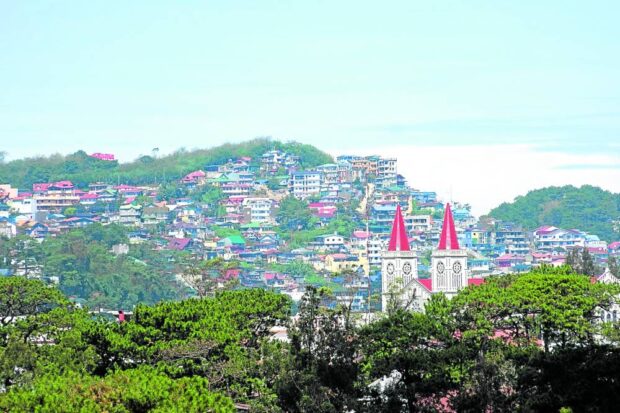Still no budget for body to guide Baguio, Benguet

SPACE LIMITS Land is a prime commodity in Baguio as every suitable space has been settled or is occupied by business ventures. The city has been sharing some prospective investments with its
neighboring towns in Benguet as part of a collaboration called BLISTT. —NEIL CLARK ONGCHANGCO
BAGUIO CITY—A metropolitan authority governing Baguio City and five Benguet towns still has no allocation in the proposed 2024 General Appropriations Act, a year after its creation lapsed into law at the end of former President Rodrigo Duterte’s term.
The Department of Budget and Management (DBM) confirmed that the operational fund of the Metropolitan BLISTT Development Authority (MBLISTTDA) has yet to be integrated into next year’s national expenditure program, prompting Baguio Mayor Benjamin Magalong to ask the Regional Development Council (RDC) to intervene during its quarterly meeting on Thursday.
Patterned after the Metropolitan Manila Development Authority (MMDA), the MBLISTTDA was created through Republic Act No. 11932 to oversee and set a common economic, social and public service direction for Baguio and the Benguet towns of La Trinidad, Itogon, Sablan, Tuba and Tublay (or BLISTT).
The new metropolis would share resources to manage or regulate traffic, water supply and sanitation services.
Duterte left office without signing RA 11932, which became law on July 30, 2022, and was too late to be included in the 2023 national budget, according to the law’s sponsor, Baguio Rep. Marquez Go, in a previous interview.
Article continues after this advertisementWithout a budget, “panay meeting lang kami (all we do is meet),” said Susan Sumbeling, Cordillera director of the National Economic and Development Authority, which acts as the MBLISTTDA secretariat.
Article continues after this advertisementThe new agency had asked for a P42-million starting fund to begin organizing its bureaucracy next year, she told the Inquirer.
Magalong said the budget proposal was reduced to P36 million, but it was not included in Malacañang’s 2024 expense plan.
The new budgeting delay was attributed to MBLISTTDA’s plantilla, which was cleared only recently, said Irene Gahid, DBM Cordillera director, during the RDC session.
Decongestion plan
Agencies like the Civil Service Commission reworked the plantilla because of a gap between the metropolitan administrator, who has the rank of undersecretary, and the rest of MBLISTTDA’s employees, said lawyer John Ray Libiran, Go’s legal officer.
A possible recourse is for the government to tap “lump sums” in the draft budget law to finance BLISTT, Gahid told Magalong.
BLISTT used to be an economic collaboration between the city and its closest neighbors. It started out as an urban development framework pushed by the late architect Joseph Alabanza to decongest the overpopulated and overdeveloped Baguio as it began reconstruction following the devastation wrought by the 1990 Luzon earthquake.
Originally, without Tublay, BLIST would have moved many of Baguio’s investments to adjacent towns that would serve as industrial and suburban zones. BLIST was also explored by European planners who drew up the 1992 Baguio-Dagupan Urban Planning Project which situated new subdivisions and industrial centers on the hills of Tuba and Itogon, one of the country’s oldest mining towns.
‘Layer of bureaucracy’
RDC vice chair Edna Tabanda, a former La Trinidad mayor, said she had reservations about a metropolitan authority governing BLISTT. Tabanda said she was serving as mayor when the concept was first introduced simply as a medium for cooperation among local governments.
“MBLISTTDA is another layer of bureaucracy,” she said.
But Kalinga Gov. James Edduba supported Magalong’s appeal, saying BLISTT is the prototype for another proposed metropolis called the Eastern Cordillera Growth Corridor, an agricultural development zone covering Tabuk City in Kalinga, the town of Paracelis in Mountain Province and Alfonso Lista town in Ifugao.
“Our growth corridor has not gotten the same traction as BLISTT,” Edduba said.
Under the new law, the metropolitan authority of BLISTT is technically “under the administrative supervision of the Office of the President of the Philippines” and shall “perform planning, monitoring, and coordinative functions [and] shall exercise regulatory and supervisory authority over the delivery of area-wide services within the jurisdictions of the concerned city and municipalities without diminution of the autonomy of the local governments concerning purely local matters.”